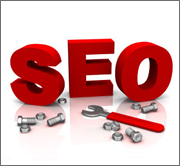Pay per click advertising (PPC) has taken root in businesses large and small. This should come as no surprise to anyone who follows business news. Google’s recent quarterly revenues grew to $9 billion. Many business owners and managers are familiar with Google’s AdWords pay per click (PPC) search advertising service. But how many are familiar with search engine optimization (SEO) strategies and techniques? Not nearly as many. Yet SEO offers a tremendous opportunity.
It’s not hard to understand why business leaders know more about PPC vs. SEO. PPC is much more accessible than SEO. Google has done a nice job educating business leaders about PPC and the AdWords website is relatively easy to use. It’s not difficult for a business person to set-up a PPC campaign (although it IS easy to set-up an ineffective campaign if you don’t know what you’re doing).
SEO, on the other hand, requires knowledge of SEO strategy and techniques along with knowledge of HTML coding. It’s not as if SEO is rocket science. But unlike PPC, there’s no easy way to simply use a credit card to drive traffic to your website. SEO is messier – it involves making changes to your website HTML. SEO can also take some time to deliver the goods, but once it does, you’ll likely continue to reap the benefits without having to pay Google for clicks over and over.
So, am I advocating that you abandon PPC for SEO? Not at all. I am suggesting that you use both tools. It’s not uncommon to use PPC to get your website to rank for a keyword until your SEO work kicks in and you start ranking for that keyword organically. Once you’re on page one of Google organically, you can shift your PPC spend to another keyword.
SEO can help you lower your PPC costs by helping you to rank high on Google organically. Let’s take a closer look at what organic search means. In the image below, the organic search results are in the red box and the paid PPC search results are in the blue boxes. The organic results are the results that Google thinks best match your search term. The results in the blue boxes are search results that were paid for.
 Studies show that over 70% of the time people choose to click on organic search results over paid results. They trust the organic results more than the PPC results. So wouldn’t you rather have an organic result? You get more clicks and don’t have to pay for them.
Studies show that over 70% of the time people choose to click on organic search results over paid results. They trust the organic results more than the PPC results. So wouldn’t you rather have an organic result? You get more clicks and don’t have to pay for them.
Both PPC and SEO are designed to do the same thing – bring relevant traffic from search engines to your website. But that’s certainly not YOUR endgame. You want to convert that traffic into leads or customers. If you’re selling something that can be purchased on your website, the goal is to get the visitor to buy. If you’re like most B2B companies, you don’t sell your products via your website. In this case, you should try to convert website visitors into leads. You do this by offering visitors something in exchange for their contact information. Offer them something of value like an e-book, white paper or an introductory consultation.
“Once your web visitor has found you – whether through PPC or organic SEO – your job is to engage them and convert them into sales leads and customers. Unfortunately, we hear of many cases where the web visitor is directed to a home page – and then bounces right from the site.
A far better practice is to bring the visitor to a page that reflects the keyword entered. After all, that’s what they’re interested in. There are a number of techniques we can recommend to engage your audience once they visit your site… but that’s a subject for a later blog!
In summary, here are the key takeaways from this article:
- If you’re running PPC campaigns but haven’t invested time in optimizing your website for search engines (SEO), you’re missing out on a huge opportunity, and you could be spending money needlessly.
- Using SEO along with PPC campaigns will bring you more traffic at a lower cost than simply running PPC campaigns.
- Getting traffic to your website from PPC or SEO is not the endgame – converting that traffic into leads or customers is. This means spending time on creating and optimizing your landing pages for each PPC campaign and each SEO keyword phrase.
